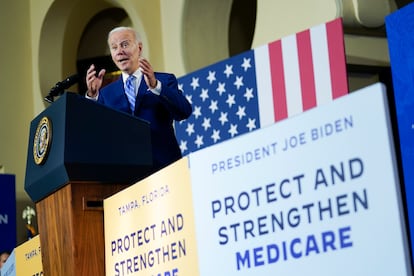Medicare and Social Security could fall short over next decade
The Social Security and Medicare trustees report says Medicare will be unable to pay full benefits for inpatient hospital visits and nursing home stays by 2031

The financial safety nets millions of older Americans rely on and millions of young people are counting on will run short of money to pay full benefits within the next decade, the annual Social Security and Medicare trustees report released Friday warns.
Medicare, the government-sponsored health insurance that covers 65 million older and disabled people, will be unable to pay full benefits for inpatient hospital visits and nursing home stays by 2031, the report forecast. And just two years later, Social Security won’t have enough cash on hand to pay out full benefits to its 66 million retirees.
The report is another prod for politicians to address the fragile financial state of the social programs, which are only expected to get more expensive in the coming years as more Americans age into eligibility for them.
“The Trustees continue to recommend that Congress address the projected trust fund shortfalls in a timely fashion to phase in necessary changes gradually,” said Kilolo Kijakazi, acting commissioner of Social Security.
Friday’s report is a mix of good and bad news: The forecasted go-broke date for Medicare was moved back three years — last year’s report predicted the government wouldn’t have enough money to start paying those benefits in 2028. But the date for Social Security’s trust was moved up one year earlier.
On its current track, Medicare would be able to cover only 89% of costs for patients’ hospital visits, nursing home stays and home health care starting in 2031. Social Security, meanwhile, will be able to cover only 77% of benefits starting in 2033.
Social Security’s disability trust fund is in much better shape — it’s not expected to be depleted within the next 75 years.
The future of Social Security and Medicare has become a top political talking point as President Joe Biden heads into his expected 2024 reelection campaign. Biden, a Democrat, has vowed to rebuff any Republican-led efforts to cut Medicare or Social Security benefits to brace for the shortfall. Instead, he’s pitched raising taxes on some of the country’s wealthiest people, those making $400,000 or more a year, to shore up Medicare.
Republican leaders, meanwhile, say they don’t intend to ax benefits either, but they’ve yet to coalesce behind a plan to keep the programs solvent. Last year, however, members of the House Republican Study Committee proposed raising the age at which someone could qualify for Social Security and Medicare.
Peterson Foundation CEO Michael Peterson said ahead of the report’s release that “if lawmakers do nothing, in less than a decade more than 70 million beneficiaries would face an automatic 23% cut, reducing the average benefit by several thousand dollars per year. We simply can’t let that happen.”
“The sooner we act, the easier it will be to ensure the future of Social Security,” he said. “Lawmakers shouldn’t take anything off the table, and the good news is there are plenty of reasonable options on both the revenue and spending side of the ledger to implement fair, gradual and common sense reforms.”
Lawmakers have for years kicked Social Security and Medicare’s troubling math to the next generation. Social Security benefits were last reformed 40 years ago, when the federal government raised the eligibility age for the program from 65 to 67. The eligibility age has never changed for Medicare, with people accessing the medical coverage when they turn 65.
The funds’ future should be a top priority for Congressional leaders, AARP CEO Jo Ann Jenkins said in a statement, calling on elected officials to hammer out a plan.
“Today’s Social Security and Medicare Trustees reports reinforce that while they are financially strong today, both programs face long-term funding needs, and Congress must act to find solutions to ensure Social Security and Medicare will be there for the next generation and into the future,” Jenkins said.
Sign up for our weekly newsletter to get more English-language news coverage from EL PAÍS USA Edition
Tu suscripción se está usando en otro dispositivo
¿Quieres añadir otro usuario a tu suscripción?
Si continúas leyendo en este dispositivo, no se podrá leer en el otro.
FlechaTu suscripción se está usando en otro dispositivo y solo puedes acceder a EL PAÍS desde un dispositivo a la vez.
Si quieres compartir tu cuenta, cambia tu suscripción a la modalidad Premium, así podrás añadir otro usuario. Cada uno accederá con su propia cuenta de email, lo que os permitirá personalizar vuestra experiencia en EL PAÍS.
¿Tienes una suscripción de empresa? Accede aquí para contratar más cuentas.
En el caso de no saber quién está usando tu cuenta, te recomendamos cambiar tu contraseña aquí.
Si decides continuar compartiendo tu cuenta, este mensaje se mostrará en tu dispositivo y en el de la otra persona que está usando tu cuenta de forma indefinida, afectando a tu experiencia de lectura. Puedes consultar aquí los términos y condiciones de la suscripción digital.








































